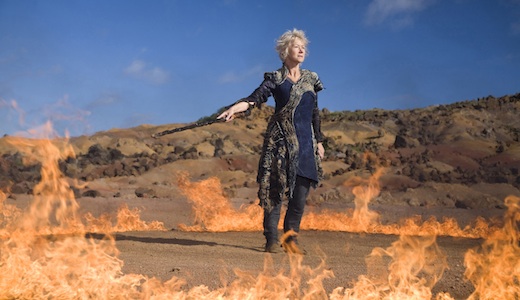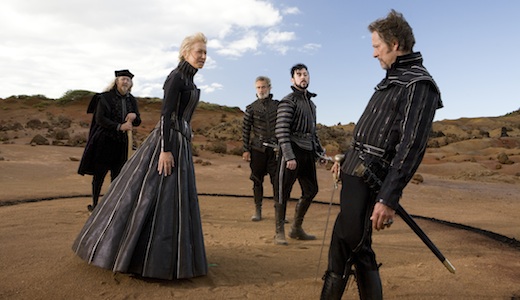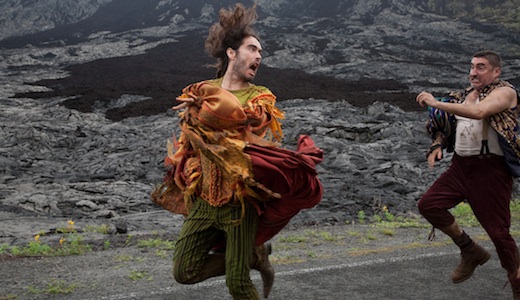In a world where a screenwriter is only as popular as his last hit, Hollywood scribe William Shakespeare has weathered the slings and arrows of the silent era of cinema through to the cutthroat politics of modern-day studio-driven monoliths.
The 420-odd films based on his works, largely written on spec, demonstrate a versatility that has spanned high school romantic comedies (10 Things I Hate About You), Samurai epics (Ran), action-romances (Baz Luhrman’s Romeo + Juliet), and even a musical (Love’s Labor’s Lost). While Hollywood divas have often found his dialogue difficult to work with, and others have simply given him a story-by credit and done their own thing (West Side Story), theatre/opera/film director Julie Taymor has worked with him at least once before (Titus) and this mutual respect has earned her a chance to once again work with his original text on The Tempest.
Milanese duchess Prospera (Helen Mirren, Brighton Rock) and her daughter Miranda (Felicity Jones, Cemetery Junction) are left stranded on an island after being usurped by Prospera’s brother Antonio (Chris Cooper, The Town). Prospera has survived on the island with the aid of the enslaved Caliban (Djimon Hounsou, Push) and the spirit Ariel (Ben Whishaw, Bright Star). After 12 years on the island, Prospera spots a chance for revenge when Alonzo (David Strathairn, Cold Souls), sailing with his son Ferdinand (Reeve Carney, in Taymor’s “Spider-Man: Turn Off the Dark”) and Antonio. Prospera causes a tempest, sending the shift adrift and casting its inhabitants ashore, and sets in motion a series of events.
The Tempest, largely thought to be Shakespeare’s last play written entirely by The Bard, has been through some of the more interesting adaptations over the last few decades. The 1956 science fiction film Forbidden Planet, the very same that introduced Robbie the Robot to the world, is a reworking of the tale of Prospero. Derek Jarman’s 1980 homoerotic version departed significantly from the text, especially during a sequence set to the the song “Stormy Weather”. Meanwhile, Paul Mazursky tackled it again two years later in modern language, playing up the sexual tension of isolation. Peter Greenaway’s Prospero’s Books gives the titular John Gielgud much of the dialogue, including lines from other characters, and shows has versatile this play is.
Director Taymor’s familiarity with the text goes back to 1986, where she made her theatre debut with a version of The Tempest. While she has since honed her distinctive visual style on stage productions “The Lion King” and “The Magic Flute”, along with the big-screen biopic Frida and Shakespeare’s Titus, in many ways she has come full circle with The Tempest, not only returning to the original text but in bringing the full weight of her visual talents to bear.
The recasting of the pivotal role of Prospero (or in this case Prospera) as a woman isn’t as revolutionary as one might suspect, at least not when the talents of Helen Mirren are involved. Indeed, perhaps the only real change audiences may notice is the gender imbalance shifts and skews men as buffoons even more that the original text. Visually, The Tempest isn’t too far removed from Taymor’s Titus, with the same barren wasteland for a backdrop complete with twisted and gnarled branches, albeit more sophisticated.
Unlike some of Kenneth Bragnah’s later film adaptations of The Bard, most notably Love’s Labors Lost, the international cast is not as left-of-centre as one might think. Alfred Molina (The Sorcerer’s Apprentice) and Russell Brand (Hop) seems to be relishing their roles as the comic relief, although the latter still just seems to be playing himself. Who knew that Brand was actually a Shakespearean fool? Meanwhile Chris Cooper and Alan Cumming are perfectly suited to the ambiguously motivated pair, and Djimon Hounsou delivers one of his best performances since Amistad.
The Tempest ain’t your daddy’s Shakespeare, and Ben Whishaw’s androgynous Ariel (complete with David Bowie mullet) threatens to tip it over into pretentiousness at times, but it is one of the more stylistically interesting adaptations for years. If nothing else, you can always just goggle at the magnificent Oscar®-nominated costumes.
A visually arresting new version of a play written over 400 years ago, and proving that it still has the power to intrigue and captivate modern audiences. While Taymor’s style may often be perceived as pretentious, and to some extent this is necessarily true, it is rare to see a film using the full extent of the cinematic medium in this way.
The Tempest was released in Australia on 21 April 2011 by Walt Disney Studios.








No Responses